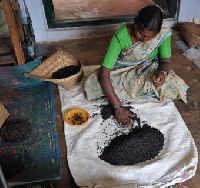
Spices
At Aadhimalai, we procure a variety of spices from the community. These are grown in the land owned by the indigenous communities. A general practice is to lease out the land to contractors for a fixed amount for a year or two. These contractors in turn reap the benefits of the crop from these resource rich land. Aadhimimalai is trying to help these farmers by providing a higher price for the produce and thus helping them in getting a higher income. The spices collected from the farmers are in turn dried or cleaned and packed by the women in the processing centres. Some of the spices also find their way into our honey varieties to give additional medicinal property to honey as well as give it a unique flavour.
...more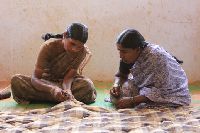
Silk Cotton
Silk Cotton or Ilavam Panju gets its name because of the silky texture of its fibre. It is taken from the pods of the silk cotton trees. It is cultivated across middle and lower elevation in indigenous landscape. It is planted within coffee plantations as hedge crops and provide a source of income for the indigenous communities of Nilgiris. Aadhimalai procures silk cotton from indigenous tribal farmer members and tribal women from Bangalapadigai clean and grade the silk cotton and make pillows, cushions and mattresses. Silk cotton products are known for its natural quality, non-allergic nature, warmth and does not crumble on prolonged usage. These products do not loose its qualities for a long period and will be fresh if kept in the sun.
...more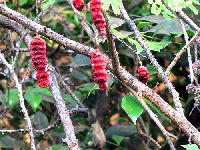
Shikakai
Shikakai literally translates to hair fruit and has been used as a natural shampoo for a long time. The fruit pods are dried and ground into a powder. This powder can be mixed with water and can be applied directly on hair. However this does not produce enough lather as a typical shampoo. However, poochakai or soap nut, another forest produce, gives the lathering property. At Aadhimalai, the indigenous community collects shikakai from the forests. These are brought to our centres. We powder the shikakai and mix it with poochakai or soap nut. Soap nut is powdered and mixed with Shikakai to come up with multiple products. The products include Ordinary Shikakai Powder, Shikakai with Vetiver, Shikakai with Hibiscus and Shikakai with Amla Powder.
...more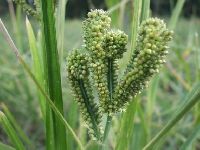
Millets
Millets have been consumed by humans since the beginning of ancient civilizations. They are highly tolerant to extreme weather conditions and do not require fertilizers or pesticides. They are considered to be more nutritious than rice and wheat. Millets were part of the traditional diet of the indigenous communities in the Nilgiri Reserve. However, rice and wheat have come to replace this nutrient rich grain variety. Keystone Foundation and Aadhimalai encourages farmers to get back to the roots and cultivate millets in their land. Millets are slowly getting back into the diet of the communities here. Aadhimalai procures minor millets like Ragi (finger millets), Samai (little millets) and Thinai (foxtail millet). A series of machines are used to thrash, dry, dehusk and grade the millets to ensure high quality.
...more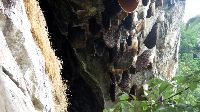
Forest Honey
We procure honey directly from the honey hunters of the Nilgiri Biosphere Reserve. Honey is collected from the honeycombs of the Apis Dorsata or the Indian Rock Bee. It gets its name from its habit of nesting beneath overhanging rocks. It is also known as the Giant Bee and is a tropical species found throughout South East Asia and the Indian sub-continent. This indigenous bee species lives only in the wild and is harvested by tribal communities living close to forested areas. The honey hunting season is between April to July. Honey hunting is considered a ritual by the indigenous community in the Nilgiri area. The Kurumbas, who are a major community who collect honey, perform a puja while going to look out for hives and mark hives so that others do not collect from the same hives. The hunter goes on a fast 12 days before the date of hunting. The honey hunting is done by a team which has a lead honey hunter. He ascends the ladder to harvest the honey from the cliffs. The rope ladder in itself is made of forest vines. It is hung below from the top of a cliff or a tree. A custom followed by the community is to have the brother of the hunter’s wife being responsible for holding the ladder in place. Five stings from a bee is enough to knock down the honey hunter, but the hunter braves these odds to collect the honey.
...more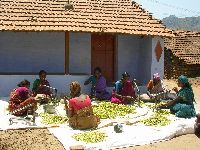
Forest Amla
Amla is known as Nelli or Nellikai or as the Indian gooseberry. It has numerous health benefits and is used as fresh fruit and as dried form. It is sour in taste with sweet secondary tastes. Amla is used immensely in Ayurveda and Sidhha forms of medicine. Amla is a powerhouse of Vitamin C. Dehydrating amla increases its shelf life incredibly without loosing its healthy ingredients.
Feature : to promote longevity – to enhance digestion – treat constipation – reduce fever
...more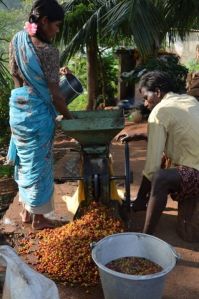
Coffee
Nilgiris Coffee is known to have a distinct flavour because of the geography and climatic conditions of the Nilgiris slopes. The Irula and Kurumba communities have agricultural lands which are intercropped with coffee and trees like jack, orange, lime, banana, silver oak and pepper vines. Spices are also grown along with coffee. Arabica is the main variety of coffee grown here. However Robusta variety is also found in some areas. The whole family is involved at the time of harvest. They pluck and process the fruits with small pulping machines at the village level. Both men and women are involved in the process, without distinction. The coffee is grown without chemical inputs and as a result, a higher value is derived for the coffee.
...more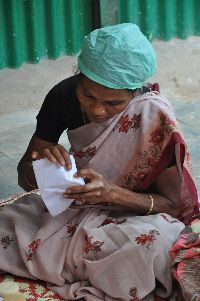
beeswax products
Beeswax is a natural wax produced by different species of bees. The hive worker bees collect and use it to form cells for honey-storage and larval and pupal protection. Scales of wax is secreted into the hive. The wax is initially colourless but becomes opaque after getting mixed with pollen brought in by hive worker bees. It becomes yellow or brown on getting mixed with pollen oils and bee saliva. When honey hunters extract honey, they cut off the beeswax cap from each honey comb cell. The colour varies depending on the amount of pollen and bee saliva and the type of flowers gathered by the bees. The beeswax must be melted and filtered to remove the impurities. The use of beeswax is widespread and varied. It is mainly used to make candles and as an ingredient in the cosmetic industry as a substitute of paraffin wax. In the Nilgiris, the indigenous communities used to discard beeswax in the forests while going for honey hunting. Over the course of multiple training sessions conducted by Keystone Foundation, the honey hunters have realised the value of beeswax, so much so that the price obtained for beeswax is more than that of honey.
...more
Basil Soap

Jasmine Soap
Be first to Rate
Rate This